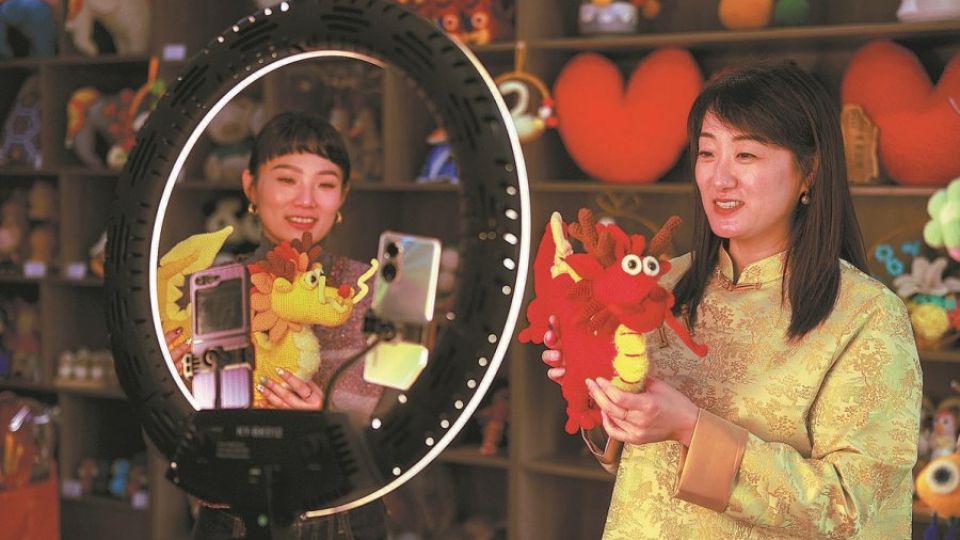January 31, 2024
BEIJING – As the Year of the Dragon approaches, sales of products with dragon elements have witnessed explosive growth on major e-commerce platforms, which experts said indicates not only the strong resonance of traditional Chinese culture among consumers, but also the vitality of the nation’s consumer market.
Dragon, or long in Chinese, a mythical and auspicious creature that is the fifth animal of the 12-year Chinese zodiac cycle, is considered to be a sacred symbol of good luck, strength and fortune in China. The purchasing frenzy ahead of the upcoming Spring Festival holiday is expected to further shore up consumer confidence and bolster the recovery of consumption, the experts added.
Data from e-commerce platform JD showed that searches for dragon-related merchandise via its online marketplace have surpassed 23 million since January, with dragon-themed Moutai, commemorative coins and apparel leading the trend.
Since the launch of JD’s Spring Festival promotional campaign on Jan 17, the transaction volume of dragon-themed commodities in more than 800 subcategories has soared more than tenfold year-on-year, according to the company.
It said products with dragon-themed elements, such as car ornaments, household accessories, clothing, daily necessities, alcohol, maternal and infant goods, and gold jewelry have been favored by consumers.
Purchases by the post-1990s and post-2000s generations accounted for nearly 55 percent of the total, while consumers in Guangdong province, Beijing, Jiangsu province, Shanghai and Shandong province, in that order, were the top five spenders on dragon-featured items, according to JD.
Jason Yu, general manager of Kantar Worldpanel China, a market research provider, said that because the dragon is an important symbol of Chinese traditional culture and is believed to bring good luck, Chinese consumers who buy dragon-themed goods are expressing their hopes for a better life in the new year.
Yu noted that China’s Generation Z shoppers — those born between the mid-1990s and the early 2010s — are displaying a heightened sense of national pride and confidence in Chinese culture, and “their pursuit of the Year of the Dragon products has also injected fresh vitality into the inheritance of traditional culture”.
Dragon-themed red envelopes, refrigerator magnets, mobile phone cases, underwear and socks have gained popularity among Chinese consumers, according to Taobao, the online marketplace of Chinese tech heavyweight Alibaba Group.
Searches for dragon-related products skyrocketed 640-fold year-on-year between Dec 27 and Jan 2 on Taobao, according to the company. Among the items, gold ornaments with dragon elements saw a 500-fold increase in search volume, while searches for “limited collections for the Year of the Dragon” soared more than thirtyfold compared with the same period last year.
More than 30 museums, such as the Palace Museum in Beijing, the Gansu Provincial Museum and the British Museum, have launched over 1,000 limited editions of dragon-related products on Tmall, Alibaba’s business-to-customer e-marketplace.
The rich cultural connotations and the good wishes that the dragon carries have not only stimulated people’s passion for buying, but also satisfied their rising demand for personalized and creative products with unique cultural symbols, said Hong Yong, an associate research fellow at the Chinese Academy of International Trade and Economic Cooperation’s e-commerce research institute.
“Spring Festival is the traditional festival that Chinese people attach the most importance to, and it’s also a peak season for consumption,” Hong said, emphasizing that brands should capitalize on traditional Chinese culture to launch more innovative products.
The shopping craze for dragon-related products ahead of Lunar New Year is crucial for expanding domestic demand and promoting the recovery of the consumer market, he added.


